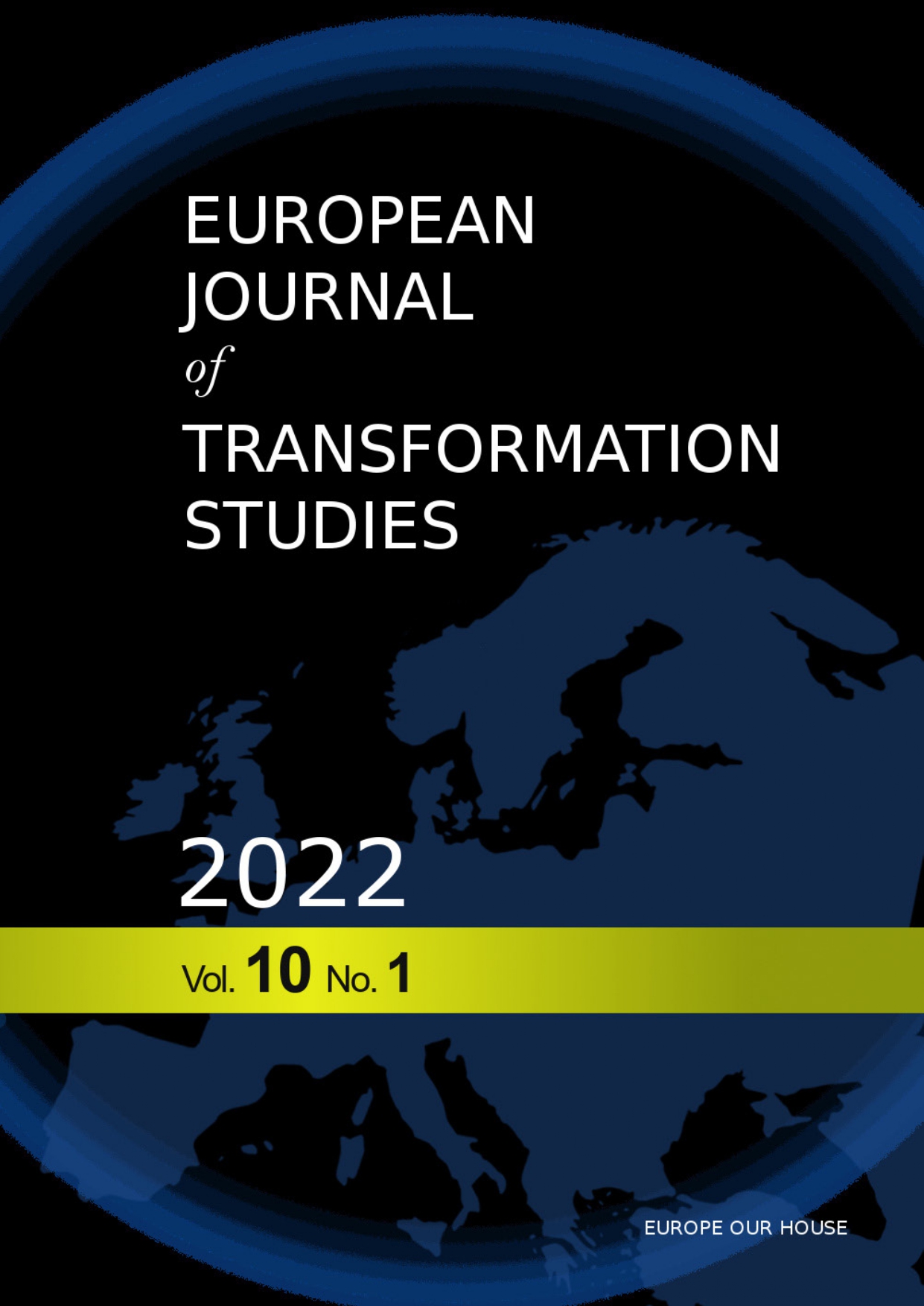Influence of the power and the opposition on democratization dynamics in the Slovak Republic
Słowa kluczowe:
Democratization, Opposition, Power, Political Processes, Political System, the Slovak RepublicAbstrakt
Available differences between the transition to democracy and its consolidation have actualized the need for researching conceptual perspectives of the functioning of political institutions and constructing an optimal model of their interaction as a guarantee of further democratization. The goal of this paper is to determine the influence made by the ruling authorities and the opposition on the dynamics of democratization in the Slovak Republic. The combination of methodological principles based on the concept of social capital conversion, fluctuation theorem, institutional and neo-institutional approaches constitutes the methodological foundation of the research. The paper has determined specifics of the interrelationship between the power and the opposition in the state before 2020 in the context of current political processes. The main conclusion reached is that the process of democratization in the Slovak Republic has significantly depended on the strategies of social capital accumulation and conversion, selected and implemented by the power and the opposition, as well as on the development of stable dispositions between them in the political field.
Downloads
Bibliografia
Ágh, A. (1995). The experiences of the first democratic parliaments. East Central Europe. Communist and Post-Communist Studies. Vol. 28, No 2, pp. 203–214.
Bertelsmann Transformation Index. Slovakia Country Report (2016) [online; accessed 2020- 03-21]. Available from www: <https://www.bti-project.org/fileadmin/files/BTI/Downloads/Reports/2016/pdf/BTI_2016_Slovakia.pdf>.
Bertelsmann Transformation Index (2018). Democracy Status. Slovakia [online; accessed 2020-03-21]. Available from www: <https://atlas.bti-project.org/share.php?1%20*2018*TV:SDS1:MAP*DOA*%20TOPO:REGION:TOF>.
Bourdieu, P. (2002). Formy kapitala. Ekonomicheskaya sociologiya. Vol. 3, No 5, pp. 71–72.
Buslenko, V. (2014). Modeljuvannja vidnosyn “parlaments’ka opozycija – urjad” u Slovachchyni v 90-ti roky: kontekst, instytucijni chynnyky, potencial ta rezul’tatyvnist’. Studia Politologica Ucraino-Polona. Vyp. 4. Zhytomyr-Kyjiv-Krakiv: FOP Jevenok, O., pp. 145-152.
Chal’ceva, O. (2017). Publichna polityka: teoretychnyj vymir i suchasna praktyka. Vinnycja: FOP.
Baranovs’ka T. 336 р. Cusio, T. (2001). Transition in Post-Communist States: Triple or Quadruple? Politics. Vol. 21. No 3, рр. 168-177.
Diamond, L. (1999). Defining and Developing Democracy. In: Developing Democracy Toward Consolidation. Baltimore: The John Hopkins University Press, рр. 1–19.
Economist Intelligence Unit. (2018) [online; accessed 2021-04-11]. Available from www: <https://infographics.economist.com/2018/DemocracyIndex/>.
Kljuchkovych, A. (2019). Perekhid do demokratiji v Slovachchyni: dynamika ta superechnosti suspiljno-politychnykh transformacij. Uzhghorod: AUTDOR-ShARK, 416 р.
Kopecky, P. Spirova, M. (2008). Parliamentary Opposition in Post-Communist Democracies: Power of the Powerless. Journal of Legislative Studies. Vol. 14, No. 1/2, рр. 133-159.
Kubát, M. (2010). Political Opposition in Theory and Central European Practice. Praga: Peter Lang, 194 р.
Leška, D. (2013). Hlavné etapy formovania systému politických strán na Sloveňsku po roku 1989. Sociológia. No 45, č. 1, рр. 71-88.
Malová, D. Učeň, P. (2011). Slovakia. European Journal of Political Research. No 50. рр. 1118– 1129.
Marušiak, J. (2017). Political Entrepreneurs as a Challenge for the Party System in Slovakia. Politologický časopis. Czech Journal of Political Science. No 2, рр. 179-200.
Merkel, W. (2004). Embeded and defective democracies’. Democratization. No 11(5), рр. 33-58.
Mesežnikov, G. Kollár, M. Vašečka, M. (2011 а). The World Bank, World Development Indicators, рр. 500–506.
Mesežnikov, G. (2011 в). Parlamentné vol’by 2010 a vývoj systému polityckých strán. Slovenské vol’by 2010. Šanca na zmenu. Bratislava: Inštitút pre verejné otázky, рр. 59-79.
Patrushev, S. ed. (2006). Institucional’naya politologiya: Sovremennyj institucionalizm i politicheskaya transformaciya Rossii. Moskva: ISPRAN, 586 р.
Polity IV Project: Political Regime Characteristics and Transitions, 1800-2013. (2013). [online; accessed 2021-03-07]. Available from www: <https://www.systemicpeace.org/polity/slo2.htm> .
Popper, K. (1988). The Open Society and its Enemies Revisited. Economist. April, No 26. 274 р.
Reisinger, W. (2003). Vstanovlennja ta zmicnennja demokratiji. In: Guzina, D. ed., U poshukah pravyl’noji paradygmy: konceptual’ni perspektyvy postkomunistychnogo perehodu u krajinah Shidnoji Jevropy. Kyjiv: Vydavnycho-poligrafichne TOV “Aj Bi”, рр. 77-106.
Sorokin, P. (2007). Glavnye tendencii nashego vremeni. Moskva: Direkt-Media, 416 р.
Szomolányi, S. (2011). Slobodné vol’by v strednej Európe po dvadsiatich rokoch: čo vypovedajú o stave a perspektívach demokracie? Slovenské vol’by 2010. Šanca na zmenu. Bratislava: IVO, рр. 9–25.
Worldwide Governance Indicators (2018) [online; accessed 2021-02-24]. Available from www: <https://info.worldbank.org/governance/wgi/Home/Reports [Accessed 15.05.2019]>.

 Uniwersyteckie Czasopisma Naukowe
Uniwersyteckie Czasopisma Naukowe



